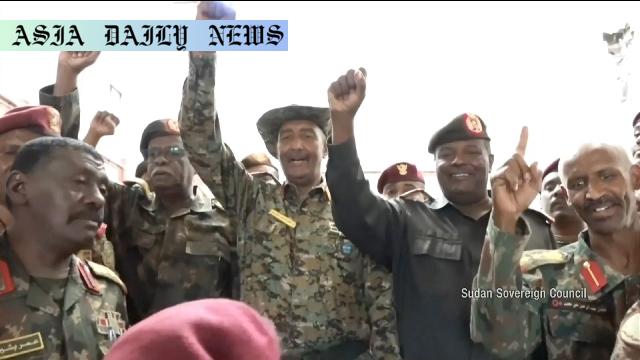Khartoum reclaimed as Sudanese military declares victory over RSF, marking progress amidst ongoing humanitarian crisis.
Sudan’s military chief declared Khartoum free of RSF presence.
Key institutions in Khartoum, including the presidential palace, have been reclaimed.
Despite progress in Khartoum, RSF retains control of the Darfur region.
Conflict continues with over 28,700 deaths and millions displaced.

Sudan’s Capital Reclaimed Amid Ongoing Power Struggle
Sudan has been embroiled in a relentless conflict since April 2023, following the outbreak of hostilities between the Sudanese Armed Forces (SAF) and the paramilitary Rapid Support Forces (RSF). Despite adversity, a significant tactical victory has emerged with General Abdel Fattah al-Burhan, leading the SAF, declaring Khartoum free of RSF occupation. The announcement, made on a significant Wednesday statement, highlights the SAF’s success in reclaiming pivotal locations such as the presidential palace and other governmental institutions. But while the liberation of Khartoum marks a pivotal step, the road to peace in Sudan remains steep, as western regions, particularly Darfur, continue to experience violence and RSF dominance.
The Humanitarian Fallout of the Sudanese Conflict
Alongside military maneuvering, the conflict’s toll on civilians increases at an alarming rate. Data from independent NGOs indicates over 28,700 deaths by the end of November 2024. Furthermore, the United Nations reports over 12 million people forcibly displaced as of March 2024. Beyond the immediate statistics lie countless untold stories of lives disrupted, families torn apart, and futures marred by violence. UN High Commissioner for Human Rights Volker Turk has been vocal in his criticism, urging both warring factions to obey humanitarian law and prioritize civilian safety. Sadly, reports of indiscriminate harm to non-combatants remain a staple of this conflict, revealing the deeply entrenched challenges Sudan faces on its journey toward peace.
The Strategic Importance of Khartoum
Khartoum, as Sudan’s capital, represents not only a political and administrative hub but also a symbol of national unity. The SAF’s decisive gains in recapturing Khartoum signify more than just military success; they demonstrate a renewed focus on stabilizing state functionality. Yet, as RSF forces retreat from the capital, their influence in areas like Darfur suggests that this territorial shift is part of a broader strategy rather than a complete defeat. The ongoing presence of conflict zones across the country underlines how tenuous this victory may be and raises questions about the feasibility of a united national consolidation without a definitive resolution between the SAF and RSF.
International Responses and the Urgency of Action
The international community has been quick to express alarm as Sudan’s humanitarian needs burgeon. Despite global calls for ceasefire and reconciliation, the SAF and RSF have shown little inclination toward diplomacy. Financial aid and peacekeeping recommendations flow from institutions like the United Nations and the African Union, but there is a palpable gap in effectively addressing the root causes of hostilities. It remains unclear whether the latest developments in Khartoum will encourage broader cooperation—or simply escalate tensions further. Observers argue that robust international mediation will prove indispensable in ending Sudan’s protracted conflict and rebuilding a sustainable foundation for governance.
Looking Forward: Prospects for Peace
The conflict in Sudan is far from over, even as the SAF celebrates its progress in Khartoum. The question looms: what will it take for Sudan to achieve lasting peace? The challenges are multifaceted, ranging from entrenched ethnic divisions and economic instability to the persistent lack of trust between the two factions. In this protracted struggle, the liberation of Khartoum serves as a reminder of Sudan’s resilience but also underscores the long road ahead. Comprehensive peace will require not only military victories but also genuine reconciliation, developmental planning, and the prioritization of human rights. For Sudan’s people, hope rests on the ability of local and global leaders to chart an inclusive and sustainable path forward.



Commentary
Khartoum’s Liberation: A Tactical Milestone
The declaration of Khartoum as being free from RSF control marks a significant milestone in the ongoing conflict in Sudan. For many, this development is both a source of hope and a sobering reminder of the broader challenges that lie ahead. The SAF’s ability to reclaim such a strategically vital city symbolizes an important shift in momentum, highlighting its determination to restore governmental authority amidst chaos. However, it is crucial to ask what this truly means for the long-term stability of the region. Is this a decisive turning point, or merely a temporary respite in an escalating power struggle?
The Fragility Behind Military Success
While the SAF’s success in Khartoum is commendable, it also exposes the fragility of Sudan’s current state. The ongoing displacement of millions and the staggering human toll, as underscored by recent UN data, spotlight the deeper crisis beneath this apparent victory. Khartoum may be free, but Darfur and other areas remain mired in turmoil, and the scars of conflict run deep. Additionally, the relentless attacks on civilians and civilian infrastructure cast a long shadow of doubt over the moral and strategic compass of the warring factions.
A Call to Action for Global Leadership
The role of the international community in crises like Sudan’s cannot be overstated. Diplomatic engagement often lags far behind the immediacy of human suffering. The need for intervention—whether through humanitarian aid, peace negotiations, or targeted pressure on both parties to adhere to international law—has never been more urgent. As Khartoum breathes a tentative sigh of relief, the world must remember that lasting peace is a collaborative effort, requiring sustained attention and resources. The fight for Sudan’s future involves not only its people but also the collective will of a watching world.